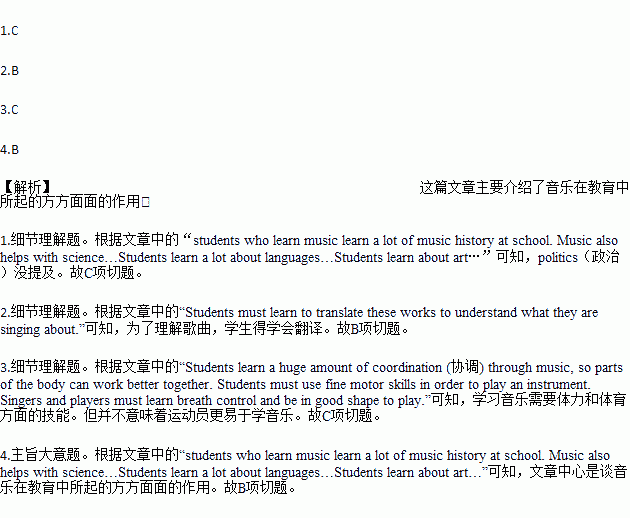题目内容
Music is often thought of as “easy” or “play time”,but it's not that at all.Music plays a very important part in our education.Students who learn music learn a lot of music history at school.This includes “modes(调式)”,which were used in churches during the development of music.They are still used today.Students learn about the historical events that were taking place when the music they play was written.They learn what the music was used for.So much of our culture is in music and has been for centuries.Music also helps with science.Students use science to help them discover what sounds good together and what doesn't.Students also need science to understand something called the “overtone series”,which is about how music is produced by vibration(颤动)and why.Students learn a lot about languages.Many songs are written in other languages,including ancient ones.Students must learn to translate these works to understand what they are singing about.Some songs are famous poems or short works set to music.Students learn a huge amount of coordination(协调)through music,so parts of the body can work better together.Students must use fine motor skills in order to play an instrument.Singers and players must learn breath control and be in good shape to play.
Students learn about art.Some famous pieces were written about important works of art,and students learn about the artists and styles as they're playing the music.Music education also brings higher thinking to our children.It allows them to think about complex patterns (How can I make my part sound better?How do this music and these different parts fit together?).Students have to know absolutely what every other musician does at all times.In that way,it develops teamwork.As one can see,music is very important to education besides bringing us fun.
1.Learning music is helpful to the following subjects EXCEPT________.
A. science B. language
C. politics D. history
2.Students who learn music have to translate songs________.
A. because they are learning the language
B. because they must understand what they are singing about
C. because the songs are ancient ones
D. because they are famous poems
3.Which of the following is NOT true according to the passage?
A. Modes are still used in modern music.
B. Different kinds of music show different cultures.
C. It's easier for athletes to learn to play an instrument.
D. A good musician should know the importance of teamwork.
4.What is the main idea of the passage?
A. The importance of music.
B. The importance of music education.
C. Ways to learn music well.
D. Skills music students should have.

